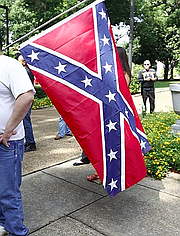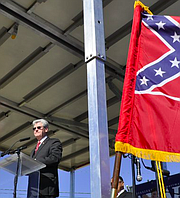I was sitting with a Jackson business owner five days after I told the world that Mississippi Gov. Phil Bryant had taken the time during Black History Month to sign a proclamation honoring "Confederate Heritage Month" in April. Suddenly, a jovial conversation turned serious, and pain crunched up her face. "He doesn't know how this hurts people," she said. "I don't get it."
My businesswoman friend, who is black, is clear-headed and pragmatic, mixing straight talk about race and racism with talk of personal responsibility. She knows the fear of encountering a police officer in a nation where many unarmed black people are hurt by them and then blamed for it. And like many black women, she enjoys hip-hop, but violent, misogynistic lyrics anger her.
My friend is also a successful business owner in the state she grew up in—with leaders who are routinely willing to put the feelings and fears of most of its black citizens aside in order to pander to a romantic, sanitized version of Confederate history that lets their ancestors off the hook. She shakes her head with disgust and clear befuddlement at how the governor of the state could decide, in the 21st century and during Black History Month to boot, to dedicate an entire month to the "heritage" of the Confederacy.
She knows, like many of us, that Confederate leaders made it crystal-clear in speeches and documents that they formed a new nation and then started the Civil War not only to maintain slavery in Mississippi—they had recently passed laws making it illegal to free slaves here—but to force new states to allow slavery and to return fugitive slaves. (New states in the now-midwest, by then, were becoming stops on the Underground Railroad to help southern slaves flee.)
Confederates Speak
In their own words, Confederate leaders explain secession, the Civil War and their views about black people.
"They just don't care," my friend says of Bryant and the other white Mississippi leaders who pander to people determined to rewrite Confederate history.
Bryant's proclamation about "Confederate Heritage" (not "history" about that brutal four-year war, but "heritage," meaning a proud celebration) is worse than his tacit embrace of the Mississippi flag and his refusal to lead the last state to shed itself of the symbol of a war fought for bad, white supremacist reasons. (Read Confederate Vice President Alexander Stephens' racist "Cornerstone Speech" about the motives).
At least with the flag, Bryant can pretend his refusal to change it really is about the will of "the people" to keep the flag. It's a bad argument, of course: The April 2001 vote to change split along race lines, thus proving that a huge segment of our society is hurt, and even threatened, by the flag that the Ku Klux Klan used as a symbol of their terrorism, while most of the dominant race doesn't care. The fact that a majority of black people voted to change the flag should send a strong message to leaders about what the flag stands for, but our leaders since then haven't cared or responded. It seems they are too afraid of losing the Confederate vote—which an official proclamation like this only bolsters.
This proclamation is blatant pandering in multiple ways. Bryant signed it at the request of the Sons of Confederate Veterans, a group that fights to keep the emblem in the state flag and downplays the documented reasons for the Civil War at every turn. The truth is, that is their right to try—but why is it so vital that the government take their side? That sure makes it look like more of an intimidation tactic by the state to remind black people who is still in control rather than free expression. SCV folks can own and fly all the flags they want on their own property.
Knowing the proclamation could ignite a firestorm, Bryant did this one quietly, as other governors before him have done. Up in Virginia in 2010, Gov. Bob McDonnell, a Republican, issued a similar proclamation, causing a major outcry. In response, McDonnell issued an apology:
"The failure to include any reference to slavery was a mistake, and for that I apologize to any fellow Virginian who has been offended or disappointed. The abomination of slavery divided our nation, deprived people of their God-given inalienable rights, and led to the Civil War. Slavery was an evil, vicious and inhumane practice which degraded human beings to property, and it has left a stain on the soul of this state and nation."
Bryant, though, can't be bothered to mention slavery in the same proclamation as "Confederate." The day after my piece went up, his office released a statement, making the circular argument that other governors had done such proclamations, too, you know. Somehow, that doesn't make my friend, the business owner, feel better.
Gov. Bryant Proclaims Confederate Heritage Month
The Jackson Free Press revealed to the world in February 2016 that Gov. Bryant had declared April "Confederate Heritage Month," but with no mention of slavery.
The truth is that Bryant and other white "leaders" who pander to a fake, glorious history are holding our state back and running many of our best and brightest off. Like I did back in 1983, young people leave because they refuse to be a part of this cabal. Our people need the chance to turn this corner and be kinder to each other.
Bryant could see the April 2001 flag vote as an "ask" on what our black population thinks of this symbol. Real leaders would've come out of that vote thinking: "Oh, we have a problem. This has been my blind spot. Let me adjust." They could work to spread more education on real Confederate and race history to more people. When almost all black people want the flag changed, and more than a third of all 2001 voters, we need to ask why and actively listen, then form a plan for change and growth, not just dismiss so many citizens' concerns out of hand. You know, like a good business owner might do.
A Civil War History Month, if done correctly with real facts and with open hearts and minds, could do that. Mississippi should lead the nation in facing this history because, frankly, we were the heart of its worst parts, as an outlet for cotton and thus slaves, when the war started, and the immense wealth it brought. Mississippi leaders then, in our state's Declaration of Secession, made it clear why slavery was vital for crops like cotton: "These products are peculiar to the climate verging on the tropical regions, and by an imperious law of nature, none but the black race can bear exposure to the tropical sun."
Leaders like Bryant must stop holding white Mississippians down to the bigotry of low expectations for fellow white people. They expect us to be racist, to hold onto the ideals of the Confederacy, to vote for them (and their corporate donors) if they fan the flames of our assumed need—that is, that we white residents still want to be feel superior to non-whites and celebrate racist history. This pandering, of course, plants even more of those seeds and prolongs the cycle.
Sadly, I don't expect Bryant or Tate Reeves to step out and lead. I'd hoped Speaker Philip Gunn might, but he chose politics instead of what might be in his heart and his Christian teaching. All these men are selling out Mississippi right now, and keeping us last, when they can't find the moral courage to help lead us out of the past. Somehow we have to do it ourselves, despite them.
Read more at jfp.ms/slavery.
More like this story
- SCV: Gov. Tate Reeves Proclaimed ‘Confederate Heritage Month’ on April 3
- Mississippi Governor Declares April 'Confederate Heritage Month,' No Slavery Mention
- #ConfederateHeritageMonth: Your Essential Primer to How It Blew Up in Mississippi
- Gov. Bryant Declares April 'Unity Month,' Not 'Confederate Heritage Month'
- Stinker Quote(s) of the Week: ‘Good Ole Boy’ Talking Points By You, the Readers
More stories by this author
- EDITOR'S NOTE: 19 Years of Love, Hope, Miss S, Dr. S and Never, Ever Giving Up
- EDITOR'S NOTE: Systemic Racism Created Jackson’s Violence; More Policing Cannot Stop It
- Rest in Peace, Ronni Mott: Your Journalism Saved Lives. This I Know.
- EDITOR'S NOTE: Rest Well, Gov. Winter. We Will Keep Your Fire Burning.
- EDITOR'S NOTE: Truth and Journalism on the Front Lines of COVID-19





Comments
Use the comment form below to begin a discussion about this content.
comments powered by Disqus